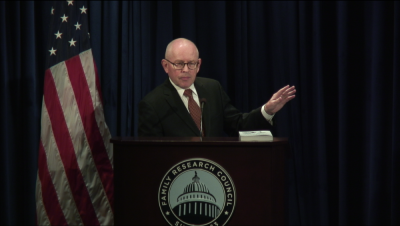Wayne Grudem's Deplorable Argument for Trump

Wayne Grudem is a very well known and highly respected theologian who has been at the center of attention for his support of Trump (July 28), then for his rejection of Trump (Oct. 9), and now for again supporting "Trump's policies"(Oct. 19).

Now, to begin, this is not a good look for Grudem. Did the tapes that led to his rejection of Trump really reveal anything new about Trump? Of course not. They simply confirmed what we already knew about him — his moral character is, let's just say, not what we would hope for in a president. What new information came out about Trump between when the tapes were released and now? As far as I can tell, not much. So maybe writing this post is a waste of time since Grudem may very well write another post next week again retracting his support for "Trump's policies."
Flip-flopping aside, what do we make of Grudem's new stance that if we don't like either candidate then we should simply vote for Trump's policies? Well, unfortunately for the American voter, Grudem's case is a complete failure for anyone who doesn't accept consequentialist-based reasoning.
Grudem considers twelve reasons one might refrain from voting for Trump, but I'm only going to focus on the two that are most closely connected to my decision to not vote for Trump.
Grudem's False Dilemma
Before responding to the reasons one might not vote for Trump, Grudem considers his options. He notes, like many of us, that voting for Clinton isn't a viable option. So, then, Grudem says he is "left with two options:
1. vote for Trump
2. vote for a third-party candidate whose hopes of winning belong to fantasy, not reality."
The problem here is that these are not the only options available. What one might also do is intentionally vote for solid, conservative members of Congress who will hold either Clinton or Trump accountable.
The most frequent reason I hear people give for voting for Trump is related to the future of the Supreme Court. Well guess what, the president doesn't get to anoint justices to the Court, the president appoints justices who then have to be confirmed. If what you're truly afraid of is Clinton appointing terrible justices, then work to elect people who will refuse to confirm those terrible appointments. That is a third alternative that can help mitigate the disaster of a Clinton (or Trump) presidency that doesn't require you to vote for either of these terrible options.
Now to Grudem's responses to those who say they cannot vote for Trump.
3. "My conscience won't let me vote for Trump."
How does Grudem respond to what is probably the most-cited objection to voting for Trump? He says,
"I fail to see how your conscience lets you help Hillary Clinton get elected, for that is the result of withholding your vote from Trump. Does it not trouble your conscience to help advance the terrible harm that she will bring to the nation?"
First, if my not voting for Trump helps Clinton get elected, then so too would my not voting for Clinton help Trump get elected. But that, of course, is sheer nonsense. A non-vote is just that, a non-vote. Similarly, it's sheer nonsense to say that a vote for a third-party is a vote for only one of the other two parties. It's a vote for neither of them.
Second, as I tell my first-year philosophy students, a rhetorical question should not take the place of an actual argument. In response to the most important objection to voting for Trump, that it violates one's conscience, all Grudem has given us is the nonsense above, plus a single rhetorical question. The problem with this is, of course, that I'm inclined to simply answer, "No. It does not trouble my conscience to refrain from voting for either Trump or Clinton." Given that it doesn't trouble my conscience, Grudem needs to give an actual argument showing me that it should trouble my conscience.
4. "If you vote for Trump youʼll never have credibility in the future when you say that character matters."
Here it's interesting that Grudem doesn't actually answer the objection. He rightly points out that our current mess has come about because of Clinton and Trump's character defects. But he then shifts gears and says,
"On the other hand, if you refuse to vote for Trump, how can you ever have credibility in the future when you say that the policy differences between candidates and between political parties matter?"
Here again is another rhetorical question in the place of an argument, but it's also worth noting that this is simply a red herring. The question was about character so we might reasonably expect the answer to also be about character. It may seem like policy is relevant to the question asked, but it's not. It's an entirely different issue that is irrelevant to how voting for Trump undermines any attempt to argue that we should care about the character of those leading our nation. All he's given us is a textbook example of the red herring fallacy.
A Remaining Problem with Grudem's Argument
What is most surprising about Grudem's argument is how quickly he resorts to consequentialist reasoning about this presidential election. Maybe he is a committed consequentialist, but I would be surprised if that were the case. The constant thread throughout his entire argument is this: "The consequences of a Hillary Clinton presidency will be really bad."
Consider again his response to the objection based on conscience: "I fail to see how your conscience lets you help Hillary Clinton get elected … Does it not trouble your conscience to help advance the terrible harm that she will bring to the nation?"
Notice the move there? I (among many others) have an objection based on conscience, but he tells us to ignore that and make our decision based on the consequences alone. That's about as consequentialist as you can get.
Now, of course, it's not that consequences never matter. In fact, in typical elections that is precisely what we consider when we make our decisions. But this is not a typical election. In this case both candidates have proved themselves to be dishonorable and not worthy to lead our great nation.
It's true that Trump has apologized for what he said on tape. Good for him. If that were the only character-related concern then maybe we could accept that apology and move on. But it's not. This is the same person who during this election season said a judge was biased because he is Mexican-American. He attacked the parents of a Muslim solider who died while fighting in Iraq. It wouldn't be hard to cite numerous other examples, but I'll close with two videos posted below.
The first wasn't something from ten years ago leaked to score political points. It's from this campaign. I know the second is an ad from his opponent Hillary Clinton, but notice that the only person speaking in the video is Donald Trump. This is the person Grudem thinks I should work to elect to the highest political office in the country. These are the actions Grudem needs to explain away to allay my objections based on my conscience and Trump's character.
I am concerned about what a Clinton-led United States of America will look like, but I cannot go out of my way to elect someone with such a questionable moral character. If he can't now treat women, minorities, and those with a disability with basic human dignity, I simply cannot trust him to act in a morally upright way as president.
Originally posted at tyndalephilosophy.com.






















